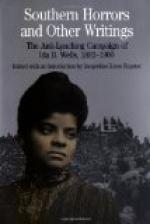Since my business has been destroyed and I am an exile from home because of that editorial, the issue has been forced, and as the writer of it I feel that the race and the public generally should have a statement of the facts as they exist. They will serve at the same time as a defense for the Afro-Americans Sampsons who suffer themselves to be betrayed by white Delilahs.
The whites of Montgomery, Ala., knew J.C. Duke sounded the keynote of the situation—which they would gladly hide from the world, when he said in his paper, the Herald, five years ago: “Why is it that white women attract negro men now more than in former days? There was a time when such a thing was unheard of. There is a secret to this thing, and we greatly suspect it is the growing appreciation of white Juliets for colored Romeos.” Mr. Duke, like the Free Speech proprietors, was forced to leave the city for reflecting on the “honah” of white women and his paper suppressed; but the truth remains that Afro-American men do not always rape(?) white women without their consent.
Mr. Duke, before leaving Montgomery, signed a card disclaiming any intention of slandering Southern white women. The editor of the Free Speech has no disclaimer to enter, but asserts instead that there are many white women in the South who would marry colored men if such an act would not place them at once beyond the pale of society and within the clutches of the law. The miscegnation laws of the South only operate against the legitimate union of the races; they leave the white man free to seduce all the colored girls he can, but it is death to the colored man who yields to the force and advances of a similar attraction in white women. White men lynch the offending Afro-American, not because he is a despoiler of virtue, but because he succumbs to the smiles of white women.
2
The BLACK and WHITE of IT
The Cleveland Gazette of January 16, 1892, publishes a case in point. Mrs. J.S. Underwood, the wife of a minister of Elyria, Ohio, accused an Afro-American of rape. She told her husband that during his absence in 1888, stumping the State for the Prohibition Party, the man came to the kitchen door, forced his way in the house and insulted her. She tried to drive him out with a heavy poker, but he overpowered and chloroformed her, and when she revived her clothing was torn and she was in a horrible condition. She did not know the man but could identify him. She pointed out William Offett, a married man, who was arrested and, being in Ohio, was granted a trial.
The prisoner vehemently denied the charge of rape, but confessed he went to Mrs. Underwood’s residence at her invitation and was criminally intimate with her at her request. This availed him nothing against the sworn testimony of a ministers wife, a lady of the highest respectability. He was found guilty, and entered the penitentiary, December 14, 1888, for fifteen years. Some time afterwards the woman’s remorse led her to confess to her husband that the man was innocent.




